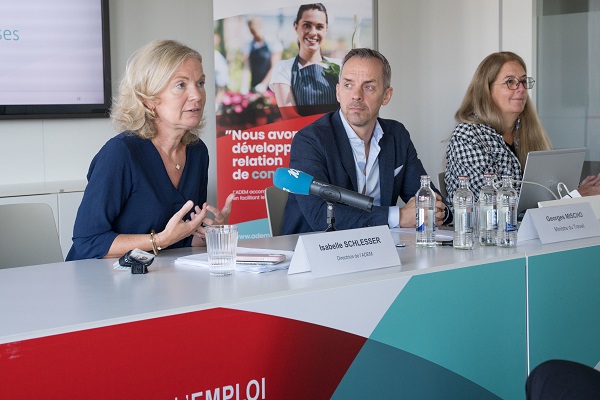 (L-R) Isabelle Schlesser, Director of ADEM; Georges Mischo, Luxembourg's Minister of Labour; Gaby Wagner, Deputy Director of ADEM;
Credit: ADEM
(L-R) Isabelle Schlesser, Director of ADEM; Georges Mischo, Luxembourg's Minister of Labour; Gaby Wagner, Deputy Director of ADEM;
Credit: ADEM
During a press conference on Friday 20 September 2024, Luxembourg's Minister of Labour, Georges Mischo, announced the closure of the ADEM branch in Dudelange, effective from 30 November 2024.
As reported by the Ministry of Labor and the ADEM employment agency, this decision is the result of the "inadequacy" of the current premises in Dudelange, making it "impossible" to provide an "optimal" service to jobseekers. "Welcoming and supporting jobseekers is a priority," insisted Minister Mischo.
According to the ministry and ADEM, the Dudelange building can no longer accommodate the approximately 1,500 jobseekers who receive support there on average each month. The space has become "too cramped" and unable to "meet ADEM's growing requirements regarding the quality of its service offering".
After several months of analysis and research to find a new site in Dudelange, the authorities dropped their search "because the alternatives did not meet the necessary criteria to guarantee a good reception of jobseekers". Instead, the services offered at the Dudelange branch will be divided between two other branches, Esch-Belval and Luxembourg-Hamm, depending on jobseekers' place of residence. Jobseekers residing in the municipalities of Roeser and Frisange (approximately 300 people) will have to meet advisors at the Luxembourg-Hamm branch. Those living in the municipalities of Dudelange, Bettembourg and in France (approximately 1,200 people) will be directed to Esch-Belval. The ministry and ADEM assured that "this reorganisation aims to minimise the impact on their journey". The thirteen employees of the Dudelange branch have also been reassigned to a new workplace.
ADEM recalled that young jobseekers under the age of 30 are not affected by this change because they have always been directed to the three largest agencies: Esch-Belval, Luxembourg and Diekirch.
Each jobseeker concerned by the upcoming closure will receive a letter "in the coming days" providing them with the relevant information on their nearest branch.
The Labour Ministry and ADEM also emphasised that the journey of a jobseeker at ADEM is not limited to their appointments at the agency. Support from ADEM includes services such as training, recruitment workshops, information sessions, CV preparation and invitations to "job days", organised in various locations and branches.
The press conference also allowed Gaby Wagner, Deputy Director of ADEM, to remind people of the support provided to jobseekers from the moment they register. She noted that ADEM offers personalised support, tailored to each individual. Upon registration, a profile analysis is carried out to direct the jobseeker towards one of three types of support: regular, moderate or intensive. Regular support aims to support the jobseeker's personal efforts to find a job quickly, while moderate support offers a final helping hand (such as language courses or a driving licence). Intensive support aims to remove major obstacles to employment, with the help of social workers, specialised educators or psychologists.
The personalised pathway includes a collaboration agreement for regular and moderate support, defining concrete steps to facilitate professional integration. For intensive support, an action plan is added, regularly updated to overcome specific obstacles.
In 2023, ADEM's 151 jobseeker advisors followed up on some 25,000 files. The volume of files to be processed by advisor varies "considerably" between a reference advisor for adults (183 files), for young people (163 files) and a specialised advisor who is in charge of people who are further away from the job market (79 files).
"Respect in our relationships with our customers and employees is one of our key values. To create a relationship of trust that allows us to identify the real needs of our customers and offer them suitable services, it is essential to welcome them in a professional, secure and modern environment," concluded Gaby Wagner.
However, not everyone was convinced of the decision to close the Dudelange branch. Dan Biancalana, Mayor of Dudelange, criticised the move. He was reported to have said that the decision would negatively impact jobseekers in Dudelange and nearby, who will now have to travel further for support. He also denounced the way in which the Ministry of Labour had communicated the decision.








